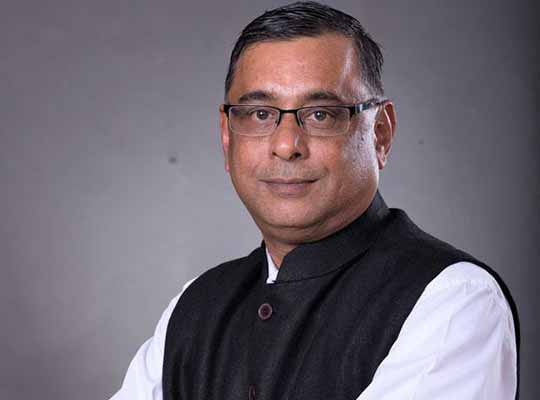TimesTech Buzz: What has influenced EESL to work on planting 1000 charging stations across the Country?
Saurabh: Investments in setting up charging infrastructure are critical to support EV penetration and to address the ‘range anxiety’ challenge. Energy Efficiency Services Limited (EESL) has been anchoring the EV eco-system development in the country undertaking demand aggregation for procuring EV’s and setting up EV charging stations. The Ministry of Power, as part of the draft policy on charging infrastructure for electric vehicles, recommends that at least one public charging station should be installed in a grid of 3 km X 3 km. This is the key objective for setting up 1000 charging stations initially by EESL.
TimesTech Buzz: How do you think India’s Electric mobility sector will boom so far in 2025-2030?
Saurabh: Global Electric Vehicle (EV) market is at the herald of a new beginning. Policy push towards adoption of EVs across major economies have led to record level increase in sales. By 2030, the International Energy Agency (IEA) estimates there will be 125 million EVs on the road, based on existing and announced policies from around three (3) million EVs in 2017. As adoption of EVs increase, their charging requirements will also increase, indicating a corresponding requirement for expansion of public charging infrastructure.
The Government of India (GOI) is proactively working towards large scale deployment of cleaner mobility solutions in the country including deployment of EVs. Alongside, several state governments are strongly working towards EV adoption. At the central level, the Energy Efficiency Services Limited (EESL) has been anchoring EV eco-system development, undertaking demand aggregation for procuring EV’s for government use. Further, it is supporting several state governments in the transition by bringing in innovative business models and implementation wherewithal for accelerated roll-out of public charging infrastructure.
It is expected that, with the promotion of EVs through a series of regulatory, fiscal and promotional measures in India, the penetration of EVs is likely to be 30% of all vehicles by 2030.
TimesTech Buzz: How is EESL impacting lives through its innovative programmes? Throw some light on EESL’s energy efficiency initiatives?
Saurabh: The following programmes target energy efficiency in stated segments as it offers enormous opportunity to save energy-
Unnat Jyoti by Affordable LEDs for ALL (UJALA):
- Hon’ble Prime Minister, on 5th January 2015 launched Unnat Jyoti by Affordable LED for All (UJALA) programme. Under UJALA scheme, LED bulbs, LED Tube lights and Energy efficient fans are being provide to domestic consumers for replacement of conventional and inefficient variant.
- Till date, over 36.7 crore LED bulbs, 71.83 lakh LED Tube lights and 23.20 lakh Energy efficient fans distributed by EESL across India. This has resulted in estimated energy savings of 47.07 billion kWh per year with avoided peak demand of 9,570 MW and GHG emission reduction of 39 million t CO2 per year.
- The programme has been able to engage with common man in a significant scale and so far, more than 9 crore consumers have taken the benefit of using these LED bulbs thus making it the largest non-subsidy-based LED lighting programme in the world.
Street Lighting National Programme (SLNP):
- Hon’ble Prime Minister, on 5th January, 2015 launched Street Lighting National Programme (SLNP) to replace conventional street lights with smart and energy efficient LED street lights across India.
- EESL replaces the conventional street lights with LEDs at its own costs (without any need for municipalities to invest) and the consequent reduction in energy and maintenance cost of the municipality is used to repay EESL over a period of time. The contracts that EESL enters into with municipalities are typically of 7 years duration where it not only guarantees a minimum energy saving (of-typically 50%) but also provides free replacements and maintenance of lights at no additional cost to the municipality.
- Till date, EESL has installed over 1.01crore LED street lights in ULBs and Gram Panchayats across India. This has resulted in estimated energy savings of 7.23 billion kWh per year with avoided peak demand of 1,205 MW and GHG emission reduction of 4.98 million t CO2 per year.
- Under SLNP, 1508 Urban Local Bodies (ULBs) have been enrolled.
Building Energy Efficiency Programme:
- EESL is implementing the Buildings Energy Efficiency Programme to retrofit commercial buildings in India into energy efficient complexes. Through these future ready solutions, EESL is creating a market for clean energy in India.
- Government of India has issued an instruction to all Departments and Ministries in August 2017 to ensure all the buildings become energy efficient. Till date, EESL has completed building energy efficiency projects in 10,344 buildings including Railway stations. Energy Audits shows energy saving potential to the tune of up to 30-50% in these buildings. The major interventions in these buildings are in area of lighting and air-conditioning systems.
EESL’s Super-Efficient AC Programme:
- With the goal of integrating energy efficiency into India’s cooling sector, EESL has initiated a first of its kind, Super-Efficient Air Conditioning programme. Consumers can buy the Super-Efficient Air Conditioners distributed by EESL at prices that are comparable to the most energy efficient ACs in the market. These Super-Efficient ACs provides 1.5-TR cooling capacity at high ambient temperature while also reducing the cost of cooling by 50%.
Decentralised Solar Power Plant Programme:
- EESL has initiated a first of its kind large scale programme wherein existing agricultural feeders is being solarized via implementation of small solar power plants at vacant/un-used lands at DISCOM substations.
- EESL is in the process of planning and execution of approx. 1,000 MW Solar Projects in the states of Maharashtra, Andhra Pradesh, Meghalaya, Jharkhand Tamil Nadu, and Chhattisgarh.
- In the State of Maharashtra, EESL has signed Power Purchase Agreement with Maharashtra State Electricity Distribution Company Limited (MSEDCL) for 200 MW solar power projects (0.3 MW to 10 MW range) in vacant/unutilized/spare lands of DISCOM. Till date, decentralized solar power plant of approx. 120 MWp cumulative capacity has been commissioned.
Atal Jyoti Yojana (AJAY) Phase I & II:
- EESL is implementing Atal Jyoti Yojana (AJAY), a sub-scheme under Off- Grid and Decentralized Solar Application Scheme of MNRE. Under AJAY, Solar LED Lights are being installed in rural, semi-urban and urban areas which don’t enjoy adequate coverage of power.
- Under AJAY Phase-I and II, EESL has installed over 1.7 lakh Solar LED street lights in rural areas of Uttar Pradesh, Assam, Bihar, Odisha, Jharkhand, Madhya Pradesh, Uttarakhand, Rajasthan and Gujarat.
70 lakh Solar Study Lamp Scheme:
- EESL is implementing 70 lakh solar study lamps scheme of MNRE. Under the scheme, solar study lamps are being distributed to school going children in the States of Assam, Bihar, Jharkhand, Uttar Pradesh and Odisha, where household grid connectivity is less than 50% as per the 2011 Census. As on date, over 63.06 lakh Solar Study lamps have been distributed/supplied to school going children.















